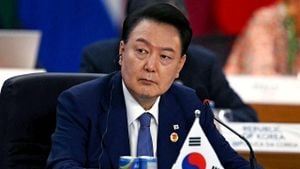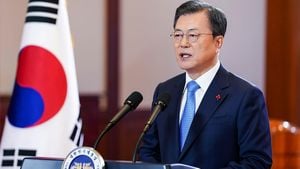Irina Viner, the celebrated head coach of the Russian national rhythmic gymnastics team, has officially announced her retirement, ending her storied tenure since 2001 which has produced numerous Olympic champions and world-class athletes. Known as the matriarch of Russian rhythmic gymnastics, Viner revealed her decision to step down during various media interviews, highlighting her desire to focus on mentoring future coaches instead.
Viner's career as head coach has been marked by unprecedented success, having led the national team to victories across four consecutive Olympic Games from 2004 to 2016, as well as multiple titles at World and European Championships. Under her guidance, stars such as Alina Kabaeva, Evgeniya Kanaeva, and Margarita Mamun emerged, achieving greatness and becoming household names within the sport.
Reflecting on her decision, Viner stated, "Rhythmic gymnastics is my life, and I am happy to have contributed to the development of this wonderful sport. Nevertheless, I have decided to resign from the position of head coach of the national team," as reported by Interfax. This sentiment encapsulates her deep emotional connection to the sport, which she has dedicated decades of her life to.
Though her achievements are monumental, Viner's methods often came under scrutiny for their intensity and rigor. Nevertheless, many former students praise her dedication and ability to cultivate champions. Kabaeva, who became one of the sport's standout athletes under Viner’s tutelage, recalled how Viner had spotted her potential, saying, "Much depended on what the coaches would say about me; the famous and insightful Irina Viner was able to see the talent for big sports within me. That is how we ended up remaining in Moscow."
Yet, as Viner departs, it doesn’t come without controversy. Tensions have reportedly arisen between Viner and Kabaeva, who has transitioned from athlete to coach and is leading her own academy, "Nebesnaya Gratsiya". This new establishment has created ripples through the gymnastics community, allowing Kabaeva’s athletes to participate independently of established national federations, causing friction with Viner’s long-standing authority.
Despite this backdrop of discord, Viner remains hopeful about the future of rhythmic gymnastics. She articulated her goals moving forward, noting, "Today I face new, equally important tasks—not just to train champions, but to pass on my accumulated experience to coaches who will prepare the next generations of stars," as she mentioned to РИА Новости.
The resignation of Viner marks not just the end of her era but also poses questions about the future direction of the sport amid shifting dynamics. Sports analysts have reflected on Viner's legacy, arguing, "This marks defeat on all fronts for Viner, as the role of head coach has become largely ceremonial with the suspension of Russian teams from international competitions." This has left many to wonder how this might impact young gymnasts and their training under the current climate.
Viner's remarkable achievements include nurturing athletes who have brought home gold medals and set world records, but her departure raises concerns over the continuity of coaching methods and competition strategy within the Russian gymnastics community. Having been at the forefront of this sport for over two decades, her absence is palpable.
The impact of Viner's resignation is felt deeply across the sport. Some of her former champions-turned-coaches have expressed their respect and gratitude. For example, Kanaeva emphasized, "They are both unique. These are legendary coaches who raised good people and great athletes. Also, they share immense patience and wisdom acquired through many years of coaching." This recognition showcases Viner's impact on creating not only champions but well-rounded individuals.
Looking forward, Viner’s decision brings forth great challenges yet opportunities for fresh perspectives to emerge within the sport. It leaves behind a void for her successors to fill, one where the next generation of gymnasts will now look for guidance. The foundation Viner has established will undoubtedly encompass future athletes, but the transition to new leadership brings both excitement and uncertainty.
Irina Viner retires leaving behind not just trophies and medals, but legacies and stories of perseverance, strength, and artistic expression—elements integral to rhythmic gymnastics. Her contributions to the sport will be remembered for generations, as she leaves behind the expectation and hopes of aspiring stars ready to shape the future of Russian rhythmic gymnastics.



